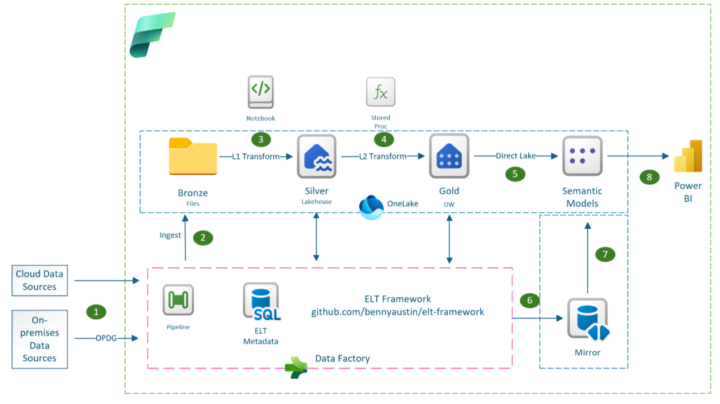Activity
Mon
Wed
Fri
Sun
Nov
Dec
Jan
Feb
Mar
Apr
May
Jun
Jul
Aug
Sep
What is this?
Less
More
Memberships
Learn Microsoft Fabric
12.7k members • Free
Fabric Dojo 织物
339 members • $447/y
3 contributions to Learn Microsoft Fabric
Lost in Pricing
I'm consulting for a small company that wants to move to Fabric. I am NOT a Fabric designer - it's why I'm here, to learn as much as I can. I need to write a proposal that includes cost estimates before I begin work. After a bunch of searching, a couple of AI chats, and a chat with a MS sales rep, I can't get a clear answer. "F64" pops up often but only because it's the size of the trial solution. I have a couple of small Synaptics DBs that I want to mirror in OneLake, join a few tables, add some columns, create a few Power BI dashboards that are filtered based on login & role (RLS), then embed the dashboards in a customer-facing web app, backed by Microsoft Entra ID. I didn't think this required so much brain damage to get a cost estimate. Please point me in the right direction. Thanks for any assistance!
5 likes • Mar 11
@Will Needham @Todd Magnusen After spending a lot of time reading and experimenting with this topic, here’s what I’ve learned: You don’t need a separate Power BI Embedded Capacity because this will now be handled under the F SKU capacity, just like the P SKUs. When it comes to licensing the Power BI Viewer part, you don’t need a separate license because the authentication will be managed via a service principal. For user authentication, you’ll need to create an embed token. This applies in the "App Owns Data" scenario, where the app is responsible for both the authentication and data access, rather than the individual users.
3 likes • Mar 12
@Todd Magnusen If you want to share your report via the Power BI app or provide direct access in Fabric, you'll need a Power BI Pro license (when the F SKU is under F64), and the users must be registered as guest accounts in Entra ID. However, if you're embedding the report within your web application, your clients won't need a Power BI license, as access will be managed through an embed token. Here are some links: https://powerbi.microsoft.com/en-us/blog/power-bi-embedded-with-microsoft-fabric/?cdn=disable, https://learn.microsoft.com/en-us/power-bi/developer/embedded/cloud-rls#dynamic-security
Power BI Licenses for Fabric
Hi, I'm Sam from London and I work as a Power BI Developer/BI Specialist for a Financial Services Company. We currently use Power BI extensively across our organisation, mainly pulling data from our Data Warehouse using SQL (Azure). I am really interested in a lot of the Fabric capabilities within Power BI, specifically Co-Pilot and Data Activator, as I think it could bring a number of tangible benefits to our company. However, we are currently on Pro Licenses. I would like to understand what licenses people would recommend to upgrade to so we can get the benefits of Fabric?
2 likes • Mar 11
@Arlette Slachmuylder @Todd Magnusen By generating an embed token, you can pass a username as part of the token for filtering purposes. The username, in this case, can be any string. From my understanding, you could write a function that dynamically assigns the correct filter based on the logged-in user’s identity. For a deeper dive into how this works, especially regarding dynamic security in Power BI Embedded, I recommend checking out the official resource linked here. https://learn.microsoft.com/de-de/power-bi/developer/embedded/cloud-rls
This looks pretty cool: Fabric Accelerator
Benny Austin, Partner Solution Architect at Microsoft, has released some resources to a GitHub repository, alongside some explanatory wiki text explaining the solution. From the repo: "This accelerator will help you build a modern data platform end-to-end with Microsoft Fabric." The architecture can be seen below. 👉 Links: - LinkedIn article - GitHub Wiki - GitHub repo Key Features: - Medallion architecture 1 - Metadata-driven orchestration using ELT Framework 2 - Resusable Data Factory Pipelines that can be readily deployed with configuration changes 3 - Reusable Spark notebooks for common transformations 4 - Automated monitoring and optimization of Lakehouses 5 - Real-time Insights into batch jobs 6 - Infrastructure as Code (IaC) Bicep for provisioning cloud resources 7 - Comprehensive documentation to assist your implementation.

1-3 of 3
@diana-geyer-6533
Data Management Consultant passionate about optimizing data solutions.
Online now
Joined May 2, 2024
Munich
Powered by




